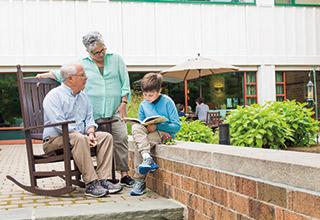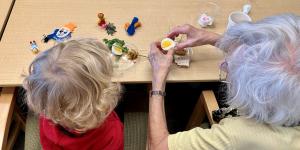Sleep and Rising Temperatures: The Hidden Impact of Climate Change on Older Adults
Amir Baniassadi, PhD, researches environmental health, and in particular, the health and well-being of older adults within the built environment.

As we strive to better understand the multi-layered intricacies of aging, one issue coming to the forefront is the connection between sleep, the environment, and the overall health and well-being of older adults. In this blog post, I’ll break down a complex matter that recently became the central focus of my research.
Sleep: A key pillar of health
Sleep has profound implications for our health and daily function. As we age, our sleep patterns change—we may find ourselves waking up multiple times in the night or waking earlier in the morning. Sometimes, we might feel that we’re not sleeping as deeply as we used to.
These changes aren’t merely inconvenient; they can significantly impact our cognitive function, our physical health, and our overall quality of life. Disrupted sleep can lead to memory issues, increased risk of falls, and reduced ability to perform everyday activities. It can also affect our mood and general sense of well-being. As such, understanding the factors that influence sleep quality in older adults is crucial in our pursuit of healthier, happier aging.
The role of ambient temperature in sleep quality
Here’s an interesting fact: Sleep tends to come easier and is often deeper and more restful in a cooler environment. This isn’t arbitrary; it’s rooted in our biology. Our body temperature naturally dips at night, which helps to initiate and maintain sleep. When our sleep environment is too warm, it can interfere with this temperature drop, disrupting our sleep.
My recent research explored how these biological tendencies interact with our physical environment, specifically focusing on the role of nighttime ambient temperature in affecting sleep quality in older adults. For nearly 18 months, I monitored sleep quality and ambient temperature in 50 older adults, many of whom where residents of a Hebrew SeniorLife community. My research revealed that sleep quality was highest when the temperature of their room was between 68 and 74 degrees, and usually dropped as the temperature increased beyond 75. However, I found a great deal of difference between people, meaning that each person has their own optimal temperature range for sleep, which may even change over time.
Climate change and urban warming: A threat looming in the night
Climate change, a term now familiar to us all, is causing shifts in our planet’s weather patterns and temperature norms. One subtle but critical aspect of climate change is the rise in nighttime temperatures—a trend that has been gradually accelerating and is predicted to continue. As our planet warms, our nights, too, are getting hotter. In addition to this, urban areas are often warmer than their surroundings at night, a phenomenon known as the urban heat island effect. This effect is also getting more intense as urban expansion and development replace more of our green space with buildings, roads, and cars.
Intersecting paths: Sleep, health, and climate change
So, where does climate change intersect with sleep and the health of older adults? Here’s the link: As we’ve already discussed, warmer nights can disrupt sleep, and climate change is causing hotter nights. This can be particularly problematic for older adults, whose sleep patterns may already be more fragile due to the natural processes of aging. In light of climate change, sleep disruptions and their subsequent health implications could become a more widespread and persistent problem for older adults.
Navigating warmer nights: Strategies for better sleep
The situation, while challenging, is not without hope. At the individual level, there are various adaptive strategies you can employ to manage warmer nights and promote better sleep. My research shows that the home indoor environment has the most influence on sleep. So, even if the temperature outside is above 90 degrees, maintaining a cool home environment
- Find your personal sleep temperature: Each person is different and it is important to tune your environment to your specific needs. Using fans or air conditioning if available, you may wish to start with a room temperature between 68 and 74 degrees and then experiment with cooler temperatures to see how it affects your sleep.
- Stay hydrated: Don’t go to bed dehydrated. On hot days, be sure to remain hydrated throughout the day. For most people, drinking about two liters or 72 ounces of water a day is enough to stay hydrated. If you have a health condition or take medications that may affect your ability to stay hydrated, it is best to ask your health care provider for advice.
- Use light, breathable sleep wear: Wearing lighter sleep clothes and using a lighter cover on the bed can help regulate your body temperature and prevent overheating during the night.
- Prepare for bedtime: Engage in relaxing activities before bedtime, like reading or listening to calming music, to prepare your body for sleep.
- Watch your diet: Avoid eating heavy meals, high-sugar foods, and stimulants like caffeine close to bedtime.
Community support and care providers: A joint effort
In managing the impacts of rising temperatures on sleep, communities and health care providers play a critical role. It’s crucial that we work together to ensure the comfort and well-being of older adults, including when it comes to sleep. Care providers should incorporate temperature management strategies in their care plans. For older adults living independently, families and communities can help implement adaptive strategies, from ensuring the availability of air conditioning to providing guidance on sleep hygiene. With the advent of smart home sensors, it is now possible to monitor the ambient temperature of our home or that of our loved ones and take action when it starts to overheat.
As a society, we also need to think about the role that the built environment plays in the face of a changing climate. We need to reconsider our priorities when designing new homes and apartments and bring back strategies such as shading from nearby trees or overhangs, and windows that actually open. Also, it is possible to make our cities cooler, both literally and figuratively, by building more parks and green spaces and using reflective rooftops and roads.
The complex interplay between sleep, ambient temperature, and the health of older adults is an issue that deserves our attention. As we grapple with the broader implications of climate change, we must not overlook its potential impact on something as fundamental as sleep. Understanding the challenge is the first step. With awareness, adaptive strategies, community support, and investment in a climate-resilient built environment, we can navigate this issue and safeguard quality of life for older adults. In the face of climate change, these actions are not merely proactive measures, but necessary adaptations for our health and well-being.
For those interested in delving deeper into this topic, here are links to some original research articles, including my recently published article. Let’s continue to stay informed and adapt together, ensuring that we provide the best care and environment for our older adults, today and in the future.
- Nighttime temperature and human sleep loss in a changing climate
- Rising temperatures erode human sleep globally
- Climate change and sleep: A systematic review of the literature and conceptual framework
- Nighttime ambient temperature and sleep in community-dwelling older adults
Exploring senior living options in Massachusetts?
Hebrew SeniorLife offers a variety of senior living communities in the Boston area for people of all income levels and abilities, including independent living, supportive senior living, assisted living, and long-term chronic care. Our options cater to various incomes and abilities, offering independent living, supportive senior living, assisted living, and long-term chronic care. We likely have the ideal choice for you or your loved one. Furthermore, our communities are actively engaged in the effort to fight climate change through sustainability efforts and our new constructions adhere to Passive House standards, ensuring comfortable air temperatures all year round.
If you're interested in learning more, we're here to assist you in making the right decision. Reach out to us at 781-859-3090 or connect with us online.
Blog Topics
Learn More
Senior Living
Hebrew SeniorLife offers a variety of senior living options, including independent living, assisted living, and enhanced living. There are options for every lifestyle and budget.





